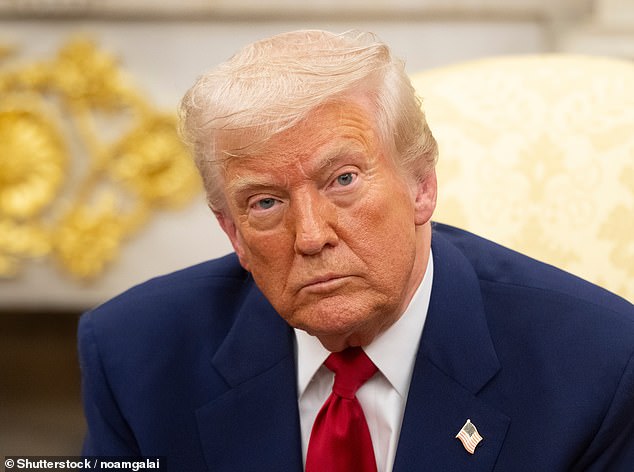[ad_1]
Trump tariff mayhem has not gone away. It will be years before the full impact of a fragmented trading system is known.
It is remarkable that despite the random outcome of the process, with many unfinished negotiations, equity markets touched new peaks in recent days.
And a resilient American economy grew at an annualised rate of 3 per cent in the second quarter. That doesn’t mean all is rosy.
The latest US labour market numbers were weaker than expected, with 73,000 new jobs added in July, and the unemployment rate climbed slightly to 4.2 per cent.
Economic aftershocks persist. An average tariff of 15 per cent is a large tax burden for the American consumer and ripples will be felt around the globe.
At the current level, the tariff impact will be six times higher than the average import duty last year.

Mayhem: It will be years before the full impact of Donald Trump’s fragmented trading system is known
Ford, which makes more vehicles in the US than its competitors, estimates a £1.5billion hit in 2025.
British luxury manufacturer Aston Martin fears that the 100,000-motor car ceiling negotiated by the Starmer government could squeeze it out of the American market.
It is evident that politics and prejudice, rather than economics and commerce, have shaped decision-making in Washington.
Switzerland is puzzling why it has been singled out for a 39 per cent tariff that is going to be a big hit for Manhattan watch aficionados.
Pharma might be the answer. Britain escaped relatively lightly with its 10 per cent tariff. But there is still uncertainty about the barriers which may be faced by the UK’s world-leading medicine companies.
The lack of rapport between Trump and Mark Carney, prime minister of Canada, means the US’s northern neighbour faces a punitive 35 per cent tariff.
Mexico’s president Claudia Sheinbaum managed a phone call to Trump which stopped the clock for three months, and will bring some relief to the car manufacturers in her country and supermarkets which sell Mexican fruit and vegetables.
A deal is better than no deal, for most. But the EU, among others, faces a substantial obstacle with its 15 per cent tariff.
There are already signs that Big Tech is switching some manufacturing back to the US. American consumers and businesses will take a direct hit from the trade wars.
But it is the US’s main trading partners, and global output and prosperity which will suffer most hardship.
Relief rally
Banks and other lenders have largely been let off the hook by the Supreme Court on car finance compensation.
It was feared finance firms could have been on the hook for up to £40billion if an appeals court decision had been upheld.
The decision should provide a fillip for shares in Lloyds, Close Brothers and Barclays – all in the eye of the car finance hurricane. They are not alone.
Chancellor Rachel Reeves cheekily sought to intervene with the Court on the grounds that if the judgement went the wrong way it could damage lending capacity and crimp her growth plans.
The Court told the Treasury to get lost. Nevertheless, a damaging blow to the Square Mile has been averted.
Consumers rubbing their hands at the thought of another payout on the scale of the person protection insurance (PPI) scandal will be disappointed.
The court struck a serious blow against the UK’s over-developed compensation culture.
DIY INVESTING PLATFORMS

AJ Bell

AJ Bell
Easy investing and ready-made portfolios

Hargreaves Lansdown

Hargreaves Lansdown
Free fund dealing and investment ideas

interactive investor

interactive investor
Flat-fee investing from £4.99 per month

InvestEngine

InvestEngine
Account and trading fee-free ETF investing
Trading 212
Trading 212
Free share dealing and no account fee
Affiliate links: If you take out a product This is Money may earn a commission. These deals are chosen by our editorial team, as we think they are worth highlighting. This does not affect our editorial independence.
[ad_2]
This article was originally published by a www.dailymail.co.uk . Read the Original article here. .

